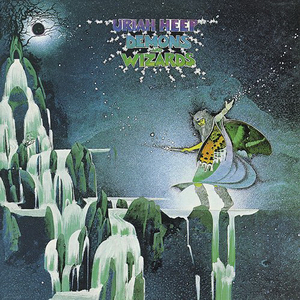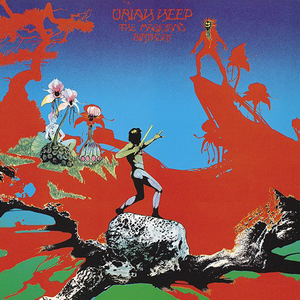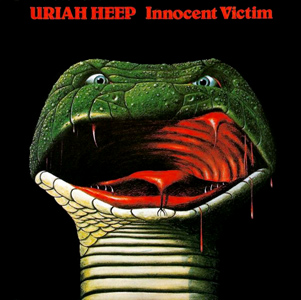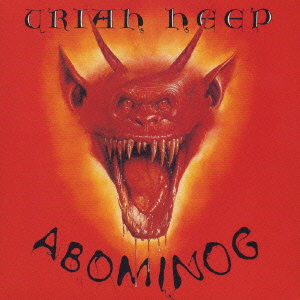
Uriah Heep are an English rock band formed in London in 1969. Their current lineup consists of guitarist Mick Box, keyboardist Phil Lanzon, lead vocalist Bernie Shaw, drummer Russell Gilbrook, and bassist Dave Rimmer. They have experienced numerous lineup changes throughout their 55-year career, leaving Box as the only remaining original member. Notable former members of the band are vocalists David Byron, John Lawton, John Sloman, and Peter Goalby; bassists Gary Thain, Trevor Bolder, John Wetton, Bob Daisley, Paul Newton, and John Jowitt; drummers Nigel Olsson, Iain Clark, Lee Kerslake, and Chris Slade; and keyboardists Ken Hensley, Gregg Dechert, and John Sinclair.

Kenneth William David Hensley was an English musician, singer, songwriter and producer, best known for his work with Uriah Heep during the 1970s.

Demons and Wizards is the fourth studio album by English rock band Uriah Heep, released in May 1972 by Bronze Records in the UK and Mercury Records in the US.

The Magician's Birthday is the fifth studio album by English rock band Uriah Heep, released in November 1972 by Bronze Records in the UK and Mercury Records in the US. The concept was "based loosely on a short story" written by keyboardist Ken Hensley in June and July 1972.

Sweet Freedom is the sixth studio album by English rock band Uriah Heep, released in September 1973 by Bronze Records in the UK and Warner Bros. Records in the US.

Return to Fantasy is the eighth studio album by English rock band Uriah Heep, released on 13 June 1975 by Bronze Records in the UK and Warner Bros. Records in the US. It was the first of the two albums to feature John Wetton as the new bass player, who replaced Gary Thain in early 1975.

Innocent Victim is the eleventh studio album by English rock band Uriah Heep, released in November 1977 by Bronze Records in the UK and Warner Bros. Records in the US.

Firefly is the tenth studio album by English rock band Uriah Heep. It was released in February 1977 by Bronze Records in the UK and Warner Bros. Records in the US. It was their first album without lead vocalist and founding member David Byron, and the first of three albums with new singer John Lawton, formerly of Lucifer's Friend. Bassist Trevor Bolder made his Uriah Heep debut on this album. Barring a break of about 18 months in the early 1980s, he remained with the group until his death in 2013.

High and Mighty is the ninth studio album by English rock band Uriah Heep, released in May 1976 by Bronze Records in the UK and Warner Bros. Records in the US. High and Mighty was the last Uriah Heep album to feature bassist John Wetton, and vocalist and founding member David Byron who was fired later that year due to his troubles with alcohol and differences with band priorities.

Fallen Angel is the twelfth studio album by English rock band Uriah Heep, released in September 1978 by Bronze Records in the UK and Chrysalis Records in the US. It is the last album to feature John Lawton on vocals, before his firing in 1979. Fallen Angel only reached No. 186 on the Billboard 200, but in Germany, the band were at the height of their popularity. On this album, the band moved toward an AOR sound, as opposed to the progressive rock of previous albums.

Conquest is the thirteenth studio album by English rock band Uriah Heep, released in 1980. It was released worldwide by Bronze Records; however, the album was never released in North America, where it was difficult to find even as an import.

Abominog is the fourteenth studio album by English rock band Uriah Heep, released in March 1982 by Bronze Records in the UK, and on July 12, 1982 by Mercury Records in the US. It was their first album without keyboardist Ken Hensley. The album was critically acclaimed and fairly commercially successful, due in part to the band retooling and updating their sound to a contemporary style and delivering a "punchier, more pop metal era-appropriate effort.

The Lansdowne Tapes is a compilation album by the British rock band Uriah Heep and released in 1993. The recordings featured on the album date from the time before the change of name to Uriah Heep and during the early sessions that culminated in material eventually used on the bands debut album.

Live at Shepperton '74 is a live album by British rock band Uriah Heep, released in 1986. It was recorded live in studio in 1974 for radio broadcasting.

The Ultimate Collection is a compilation album released by the British rock group Uriah Heep. It features songs from their debut album ...Very 'Eavy ...Very 'Umble through their 1991 album Different World.
"Blind Eye" is a song by the British band Uriah Heep, which was originally released on their fifth studio album The Magician's Birthday in 1972, and the B-side of the "Sweet Lorraine" single. "Blind Eye" was written by Ken Hensley. It charted at #97 in the U.S. Billboard Hot 100. It was included on Uriah Heep's live album Acoustically Driven in 2001. The song was recorded and mixed at Lansdowne Studios, London, in September 1972.

"Something or Nothing" is a song by British rock band Uriah Heep. The song was written by Ken Hensley, Mick Box and Gary Thain and sung by David Byron. The song is the sixth track on their seventh album Wonderworld, it is also the first track on the second side of the album. "Something or Nothing" was recorded at Musicland Studios in Munich, Germany during January and March 1974. The B-side of the song is "What Can I Do" which has never been released on the album "Wonderworld". The song is being played with only four chords: D,A,C and G. The song has been performed during Uriah Heep live concerts, and was included on their second live album Live at Shepperton '74 as the fourth track.

"Prima Donna" is a song by British rock band Uriah Heep from their eighth studio album Return to Fantasy (1975), released as the first single from the album. The song was written by David Byron, Mick Box, Lee Kerslake and Ken Hensley. It was recorded in May 1975 in Lansdowne and Morgan Studios, London. The song reached number ten in Denmark and number three in Norway.

"Return to Fantasy" is a song by British rock band Uriah Heep from their eighth studio album Return to Fantasy (1975). The song was written by David Byron and Ken Hensley and was the last single by the group to feature David Byron on lead vocals. The song was recorded in May 1975 in London in the Lansdowne and Morgan studios.

"One Way or Another" is a song by English rock band Uriah Heep. It was released on their ninth studio album High and Mighty in May 1976, and became the only single from the album and the last single with the band's former vocalist, David Byron. The song was written by Ken Hensley and featured lead vocals from John Wetton and Ken Hensley. It was recorded from December 1975 to March 1976 in Roundhouse Recording Studios in London. The single did not chart, and it is the only song on the album that was not sung by David Byron.



















